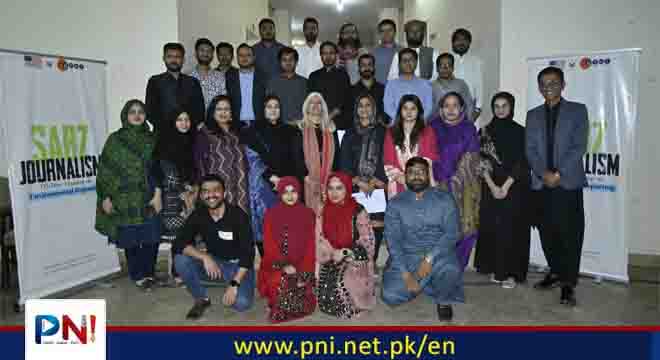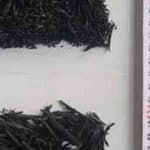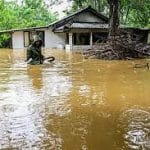Quetta, Pakistan (PNI) Nestled amidst the rugged grandeur of the Sulaiman and Toba Kakar mountain ranges and surrounded by the vast expanse of the Balochistan Plateau, Quetta, the capital city of Balochistan province in Pakistan, emerges as a beacon of both natural beauty and cultural heritage. The environmental landscape of Quetta and its surrounding region is a study in contrasts, with arid deserts coexisting alongside lush valleys and fertile orchards. Despite facing formidable challenges such as desertification and water scarcity, this land remains a symbol of resilience for its people and the intricate relationship between human communities and the environment.
The Global Neighbourhood for Media Innovation (GNMI), in collaboration with the United States Department of State, organized a 3-Day Sabz Journalism Environmental Journalism training in Quetta. Led by senior environmental journalist Afia Salam, the training aimed to empower mid-level journalists, digital content producers, and filmmakers actively engaged in climate-related reporting across various media platforms.
“Environmental journalism is pivotal in creating awareness and influencing public discourse on the pressing ecological challenges confronting Quetta,” said Husnain Raza, Director of GNMI. “With this training initiative, our objective is to empower journalists and content creators with the necessary expertise and tools to amplify climate reporting specifically tailored to the unique environmental context of the city and its surrounding regions,” he added.
“Understanding the rural dynamics and ecological diversity of Balochistan is paramount for journalists aiming to report on environmental issues accurately,” stressed Dr. Tahir Rasheed, Chief Executive Officer of Balochistan Rural Support Programme (BRSP). He also provided a nuanced picture of the biodiversity and concerning climate issues in Balochistan.
“Journalists bear the crucial responsibility of accurately reporting on environmental issues in Balochistan. We must rely on factual data and skillfully utilize digital platforms to amplify local narratives,” asserted Syed Ali Shah, Seasoned Journalist and Founder of the digital news platform Quetta Voice.
The comprehensive program covered topics such as understanding the science of the environment, distinguishing between climate and environment, data-driven and investigative story production, digital storytelling techniques, and strategies for content dissemination. Hands-on learning activities were integrated to enhance participants’ production skills, with a focus on incorporating environmental perspectives into their routine reporting.
The training featured sessions led by distinguished experts in the field, including Nasser Rind, an acclaimed independent filmmaker and documentary producer, and Shah Zaib, a seasoned digital marketing specialist. Sabz Journalism fellows were privileged to glean knowledge from their wealth of experience, gaining insights into digital news startups and marketing techniques aimed at establishing or strengthening their digital news platforms for environmental reporting.
“The climate challenges in Balochistan are multifaceted, ranging from water scarcity to desertification, and it’s imperative that we address these issues comprehensively to safeguard our environment and communities.” Remarked local journalists at the training. Another participant quoted that “Climate change poses an existential threat to Balochistan’s fragile ecosystems, and concerted efforts are needed to mitigate its impacts and ensure a sustainable future for generations to come.”
Fellows belonging to the reputable media houses of Quetta including, Pakistan Television (PTV), Voice of America (Urdu), Dunya News, Bol News, Radio Pakistan, Voice of Balochistan, CNN, Urdu Point, as well as various print and digital media outlets, participated in the event.
Sabz Journalism Fellowship Program aims to empower journalists with the necessary skills and knowledge to report effectively on environmental issues, promoting awareness and understanding among the public. The program also seeks to promote data-driven and investigative reporting, achieve inclusive economic growth and sustainable development by producing and disseminating climate-focused content on digital media platforms.
Follow the PNI Facebook page for the latest news and updates.









